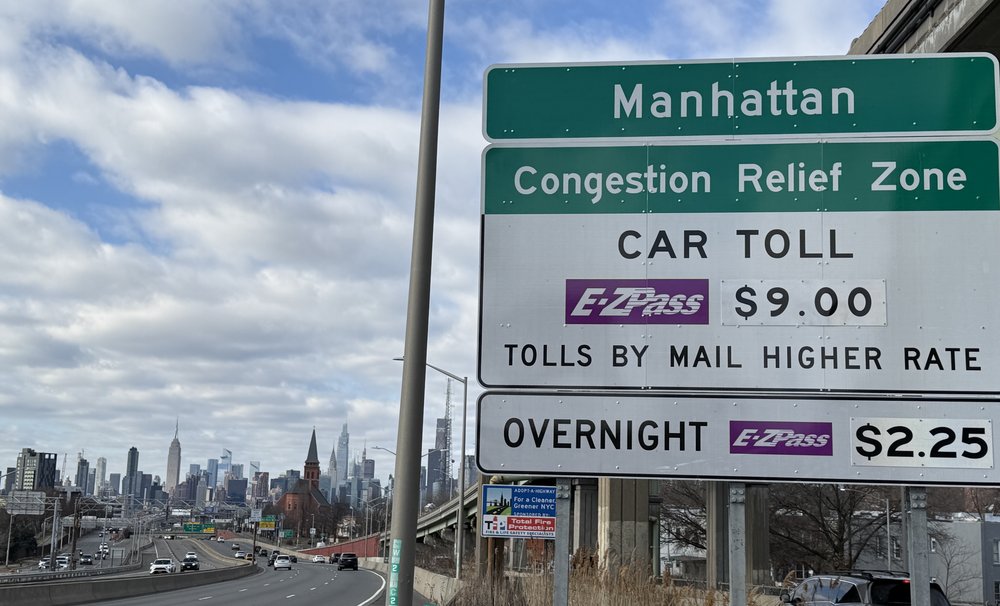NYC congestion pricing tolls rake in $48M in first month, less than initial projections
Feb. 24, 2025, 12:08 p.m.
State law requires the MTA to use the money to finance mass transit repairs.

The MTA collected $48.7 million in driver tolls during the first month of its congestion pricing program, a multimillion-dollar shortfall from the agency’s original projections, according to financial disclosures released Monday.
State law requires the money from the tolls to finance $15 billion worth of construction bonds for mass transit repairs. The new revenue figures provide the first look into the value of the tolling program, which since Jan. 5 has imposed a base $9 daytime fee on drivers entering Manhattan below 60th Street.
The MTA figures show the agency previously projected the tolls would bring in $52.1 million during January, about 7% more than the program’s actual revenue for the month.
Transit officials said the program is still on track to generate $500 million annually, which would be enough to finance its construction bonds.
"It seems from all indicators that the program is reducing traffic, but also projecting the revenue to be on target for what we had in pages of studies and what we were looking at in the fall,” MTA deputy Chief Financial Officer Jai Patel said during a committee meeting.
Ana Champeny, the vice president for research at the Citizens Budget Commission, said the revenue figures are a good sign for the MTA.
"I think this is overall a good first month showing,” Champeny said. “I think the devil will be in the details in terms of following revenues over many months and seeing how these trends play out.”
The agency released the numbers less than a week after President Donald Trump moved to pull federal approval for the program. The MTA immediately sued the federal government over the order, and Gov. Kathy Hochul said the agency would continue to collect the tolls unless a federal judge orders them to stop.
- heading
- The cost of congestion pricing
- image
- image
- None
- caption
- body
The MTA’s congestion pricing tolls went live on Jan. 5. Here are key aspects of the tolling scheme south of 60th Street in Manhattan:
- A $9 fee on passenger vehicles from 5 a.m. to 9 p.m. on weekdays and from 9 a.m. to 9 p.m. on weekends
- A 75% discount for all vehicles during the overnight hours, putting the after-hours toll at $2.25.
- A $14.40 toll for smaller trucks, such as box trucks.
- A $21.60 toll for large trucks, including big rigs.
- A $4.50 toll for motorcyclists.
- Yellow and green taxis will receive an additional 75-cent surcharge.
- For-hire vehicles such as Uber and Lyft will receive an additional $$1.50 surcharge.
- Both taxis and app-based for-hire vehicles are expected to pass the cost of the tolls onto passengers.
- Drivers who do not use an E-ZPass when entering the congestion zone will pay an extra 50%.
Matt Fabian, a partner with the research firm Municipal Market Analytics, said whether or not a judge holds up Trump’s order, the state will still need to increase taxes in order to ensure the MTA can pay for its construction projects.
“Theoretically blocking one revenue source means the state will need to create a new one as the MTA's capital needs can't go away,” said Fabian. “Realistically, President Trump is likely to keep cutting sources of federal aid to the city and state throughout his term.”
MTA officials said congestion pricing has already reduced gridlock in Manhattan, one of the program's key goals. Travel times on every crossing into the congestion zone decreased between 10% and 30% on average in the first three weeks of the program, according to the agency.
Patel said 68% of the congestion pricing revenue in January came from passenger vehicles. Another 22% came from taxis or for-hire vehicles, which don’t pay the full congestion toll but instead impose a smaller surcharge on rider fares. The remaining revenue came from trucks, buses and motorcycles, Patel said.
Patel said only 5% of the congestion pricing revenue was collected during the MTA’s off-peak hours, when the base fee for passenger vehicles drops from $9 to $2.25.
Trump declares NYC congestion pricing dead, proclaiming 'LONG LIVE THE KING'